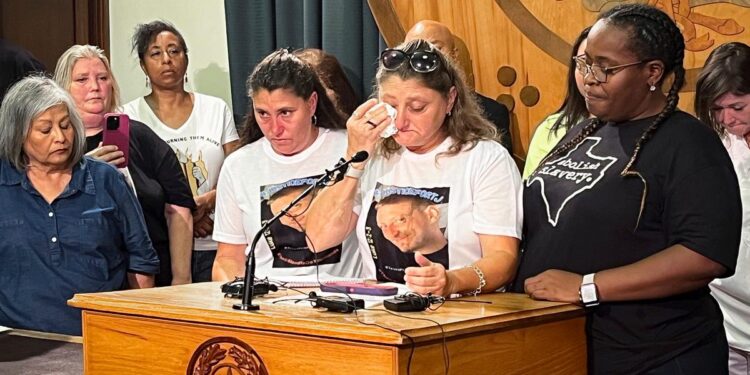Shouting, screaming and crying with raw desperation, dozens of prisoners’ relatives and former inmates gathered at the state Capitol Tuesday begging, once again, for state officials to install air conditioning in Texas prisons.
“They’re cooking our babies alive!” wailed a grieving mother, whose 36-year-old son died unexpectedly in an uncooled prison last month.
As a seemingly unending heatwave bears down across Texas, prison rights advocates and several lawmakers demanded the governor call an immediate special legislative session to cool prisons. Though similar measures failed in the Legislature earlier this year, the current heat crisis and a fear for the safety of those inside spurred them to try again.
“This is not a political issue. This is a humanity issue. I’m sick and tired of dealing with rich people problems,” said state Rep. Carl Sherman, D-DeSoto, referring to the property tax fight that swallowed the entirety of lawmakers’ summer. “This is about survival.”
Gov. Greg Abbott’s office did not respond to questions about the special session call Tuesday. In May, the Texas Senate killed the House’s proposal to invest more than half a billion dollars into air conditioning prisons.
The brutal heat inside Texas’ uncooled prisons has killed prisoners, sickened guards and cost the state millions of taxpayer dollars in wrongful death and civil rights lawsuits. Though the Texas Department of Criminal Justice has not acknowledged that a prisoner died from the heat since 2012, a multi-university study reported last year that as many as 13% of deaths in Texas prisons during warm months could be caused by the heat.
This year, since mid-June, at least nine prisoners have died of reported heart attacks or cardiac events in uncooled prisons where the outdoor heat indices were above 100 degrees, according to a Texas Tribune analysis of prison death reports and weather data. At least another 14 have died of unknown causes in extreme heat, often found unresponsive in their cells by prison staff.
It’s not clear how much of a role, if any, the heat played in the 23 deaths. TDCJ spokesperson Amanda Hernandez said last month it is inaccurate to label any death as heat-related before an investigation is complete.
Last week, she said the agency had preliminarily ruled at least four of the cardiac arrest deaths as unconnected to the heat, though autopsies are still pending. In at least one case, the agency believed a 35-year-old man who died of cardiac arrest was on drugs, which notoriously run rampant inside Texas prisons.
But heat-caused deaths are often undercounted and misclassified, according to medical experts, and an abundance of studies link an increase in fatal heart failures to extreme heat. Often, it’s impossible to know if a heart attack or any other fatal event was caused by heat stroke unless the body temperature is measured at the time.
TDCJ has not said if it checks the temperatures of prisoners in medical distress during heat waves.
/https://static.texastribune.org/media/files/b7082dfe9a7fa75d1f21930559cac749/0718%20Prison%20Heat%20Presser%20JM%20TT%2002.jpg)
For prisoners and their loved ones, the heat’s role is obvious. On her son’s final day of life, Tona Southards said he told her on the phone that he wasn’t feeling well, confessing, “Mama, I’m scared.”
Jon Anthony Southards, 36, died of unknown causes at the Estelle Unit in Huntsville on June 28. He was found unresponsive in his cell that night. The heat index outside the prison reached 116 degrees that day, according to TDCJ heat logs.
His mother appeared before lawmakers and the press Tuesday wearing his TDCJ ID tag and “prison whites,” the common name for TDCJ-assigned clothes. She spoke in sermons, reflecting on her son’s life and talents — he was an excellent artist and musician, and condemning the state for its role in his death.
“Though it may be too late for my son, Jon Anthony Southards, it is not too late for the men and women that are still serving time in these ovens,” she bellowed. “Enough is enough!”
More than two-thirds of Texas’ 100 prisons don’t have air conditioning in most living areas. Every summer, thousands of officers and tens of thousands of prisoners work and live inside concrete and steel buildings without ventilation. While temperatures are routinely in the triple digits outside, the thermometer reading often rises even higher inside.
“All those folks who say, ‘I grew up in a house with no AC,’ you didn’t grow up in a place with no ventilation, in a metal building or brick, on the fourth floor … and you couldn’t get outside,” Sherman said.
Inside the House Speaker’s press room and out on the Capitol steps, a call-and-response formed among all those who knew through their own experience or that of their relatives the fear of living through Texas summer in prison. They wiped tears from their cheeks, interjecting “right now!” during speeches to express their urgency.
“It’s hot today, but it’s only getting hotter,” Sherman concluded. “And I don’t want to visit anymore mothers who lost their children because we weren’t thoughtful.”
This article originally appeared in The Texas Tribune at https://www.texastribune.org/2023/07/18/texas-prisons-heat-deaths/.
The Texas Tribune is a member-supported, nonpartisan newsroom informing and engaging Texans on state politics and policy. Learn more at texastribune.org.



























